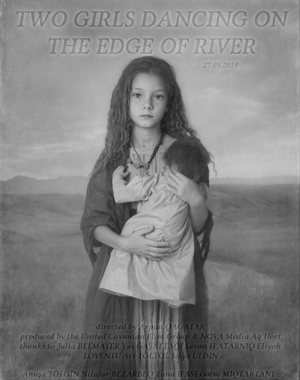User:Cavunia/sandbox: Difference between revisions
(Created page with "{{Infobox film | name = Two girls dancing on the edge of river | image = Two girl dancing on the edge of river.png | alt = | caption = Pr...") |
No edit summary |
||
| Line 26: | Line 26: | ||
}} | }} | ||
'''Two girls dancing on the edge of river''' (Kunak: ''Öz'Nin Şetinıý Örtoqaltpaşik'') is a 2019 [[Cavunia|Cavunian]] drama film directed by Arpan Qagatar and distributed by [[NOVA Media Aq'Hort]]. It was submitted to the annual | '''Two girls dancing on the edge of river''' (Kunak: ''Öz'Nin Şetinıý Örtoqaltpaşik'') is a 2019 [[Cavunia|Cavunian]] drama film directed by Arpan Qagatar and distributed by [[NOVA Media Aq'Hort]]. It was submitted to the annual Golden Sun Academy Awards and won the title of the best national screen production in December later that year. It proved to be one of the most successful Cavunian films, grossing over $12 million. | ||
==Plot== | ==Plot== | ||
The movie follows the story of a young girl, Samal, and her younger sister, Ilqa, living in a small village somewhere in the Cavunian mountains | The movie follows the story of a young girl, Samal, and her younger sister, Ilqa, living in a small village somewhere in the Cavunian mountains, most probably in early 50s. They descend from the [[Yokish people|Yokish tribe]] and, together with their parents, run a small farm. One day, while the girls are sent to the river to fill buckets, their home village is attacked by an inferior tribe. Upon returning back, Samal notices that everyone either fled or was killed and decides to seek help in a nearest city, leaving what is known to them for the very first time. | ||
==Development== | ==Development== | ||
| Line 39: | Line 39: | ||
==Reception== | ==Reception== | ||
The film was praised by the Cavunian critics for its "minimal, yet very well conveyed emotionality" and showing struggles well known to the Cavunian society after the [[Great War (Kylaris)|Great War]] - conflict between various [[Clan (Cavunia)|clans) and [[Cavunian people|tribes]] and, most especially the very infamous custom of vendetta and [[murder of honour]]. [[Golden Sun Academy]] critic, Gon Tıktar, stated that ''despite the story happening in the past, the message it conveys is still actual today''. | |||
Revision as of 15:04, 27 December 2019
| Two girls dancing on the edge of river | |
|---|---|
 Promotional poster for the movie | |
| Directed by | Arpan Qagatar |
| Written by | Arpan Qagatar Julia Belmayer |
| Produced by | United Cavunian Film Group NOVA Media Aq'Hort |
| Starring | Anuşa Tölgın Nilufar Bezarbeq Yana Ifaşi Gotsö Miqtartani |
| Cinematography | Levan H'Atarniq |
| Edited by | Yui Gaşaltaqı Eliyah Loventu Ari Töltöl |
| Music by | Sitqa Uldın |
Production company | |
| Distributed by | NOVA Media Aq'Hort |
Release dates | August 27, 2019 (Cavunia) September 11, 2019 (international) |
Running time | 83 minutes |
| Country | Cavunia |
| Language | Kunak |
Two girls dancing on the edge of river (Kunak: Öz'Nin Şetinıý Örtoqaltpaşik) is a 2019 Cavunian drama film directed by Arpan Qagatar and distributed by NOVA Media Aq'Hort. It was submitted to the annual Golden Sun Academy Awards and won the title of the best national screen production in December later that year. It proved to be one of the most successful Cavunian films, grossing over $12 million.
Plot
The movie follows the story of a young girl, Samal, and her younger sister, Ilqa, living in a small village somewhere in the Cavunian mountains, most probably in early 50s. They descend from the Yokish tribe and, together with their parents, run a small farm. One day, while the girls are sent to the river to fill buckets, their home village is attacked by an inferior tribe. Upon returning back, Samal notices that everyone either fled or was killed and decides to seek help in a nearest city, leaving what is known to them for the very first time.
Development
This was the debut film of Arpan Qagatar, that previously worked in the television. Writing, preparing and casting took him over two years but he managed to convince a group of students from Aq'Hort to help him develop the idea. Entire story is narrated in the shades of gray and there's no word spoken during the film, with only sound of horses, fire and water are highlighted. Sitqa Uldın also wrote two melodies that played during the beggining and the ending screen. Casting took place in late 2017, with eleven year old Anuşa Tölgın receiving the role of Samal and Niulfar Bezarbeq playing Ilqa. This was both girls' acting debut. The filming took place in the summer of 2018 in western Cavunia, with the village being fully set up near to the Borkan river.
The editing was being done from October to December in 2018, with the help of Floren editor, Eliyah Loventu and two Cavunian members of NOVA Media Aq'Hort. Only then it was decided to make the movie black & white. Several other variations, such as sepia styled edition, were produced but not distributed.
The film was first played in Cavunia on 27th August, 2019 and later, in September, in several other countries. It was also sumbitted for two international festivals, including Academy Award for the best foreign language film.
Reception
The film was praised by the Cavunian critics for its "minimal, yet very well conveyed emotionality" and showing struggles well known to the Cavunian society after the Great War - conflict between various [[Clan (Cavunia)|clans) and tribes and, most especially the very infamous custom of vendetta and murder of honour. Golden Sun Academy critic, Gon Tıktar, stated that despite the story happening in the past, the message it conveys is still actual today.